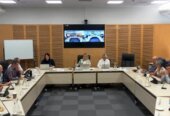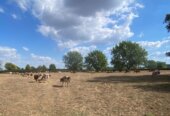
Te Awamutu Primary School environmental leader Kathryn Picard with her core group of helpers and the Enviroschools Silver Award the school recently received. They are Cortez Moana Tui, Alexis Ripia and Elias Herrick, and kneeling are Corey Powell, Vienna Seabright and Jackson Kelly.
Te Awamutu Primary School earned a Silver Award in the national Enviroschools programme.
“The Enviroschools facilitator came to visit recently and reflected with the children on what we have been doing at the school,” the school’s environmental leader, year 1 and 2 teacher Kathryn Picard.
“It was decided that we meet the criteria for the Silver Award … we’re thrilled.”
Students across the school raise chickens and sell eggs, nurture bees then bottle and sell the honey, pop their lunch leftovers into a thriving worm farm, grow native seedlings as part of the Trees for Survival initiative, grow, reap and distribute fruit and vegetables, reduce waste and recycle wherever possible, and have stepped up their anti-plastic tactics.
They make wax wraps for their lunches to reduce plastic, and disposable plastic plates that were once standard fare at school functions have been replaced by normal plates donated by families. School certificates are now made in card and presented without being laminated.
An additional side to their eco-learning has been incorporated into the school’s Kura Kotahi Raa, which is attended by some students on a weekly basis and run by deputy principal Kim Tautari-Scott.
That group has been taught about planting according to the phases of the moon, and have sown traditionally grown vegetables, such as corn and Māori potatoes, in the school’s vegetable garden.
Kathryn said lockdown had presented several challenges. The chickens were taken off-site, and special arrangements had to be made to maintain the beehives, the worm farm and plants growing in situ, either in the purpose-built vegetable beds or in the growing units, which accommodate hundreds of seedlings. Some trays of seedlings were also taken off site and cared for by staff members or students’ families.
The worm farm has been going for at least 11 years, and the bees about three to four years. Te Awamutu Primary – or TAPS – joined the Enviroschools programme in 2015 and earned a Bronze Award a year later.
“Our next goal is the Green-Gold Award. It might take us a couple of years to get there, but I’m sure we will,” said Kathryn.








